Berkey vs Reverse Osmosis: Unbiased Comparison for Choice
Did you know that the quality of your drinking water can significantly impact your health and the environment? As someone who’s been on a journey towards a non-toxic lifestyle, I’ve learned that choosing the right water filtration system is crucial. Berkey and reverse osmosis are two systems that have caught my attention, and perhaps yours too, hence you’re here.
In this article, we’ll delve into the Berkey vs reverse osmosis debate. We’ll explore the pros and cons of each system, from their filtration capabilities to their environmental impact. My aim is to help you navigate this complex decision with clarity and confidence.
So, if you’re ready to take a step further into a healthier, non-toxic lifestyle, let’s dive into the world of water filtration. Together, we can make informed choices for our homes and our planet.
Introduction to Berkey and Reverse Osmosis Systems
The topic of Berkey vs reverse osmosis often comes up when discussing water filtration, thanks to their unique methods and benefits. Both systems are celebrated for their water purification capabilities, yet they serve different needs and preferences, especially when considering the legal limits on contaminants set by the EPA.
Berkey filters have been a part of my journey towards a non-toxic lifestyle. They operate as gravity-based systems, using charcoal filters to purify water. This approach is perfect for those of us who value portability and want a solution that doesn’t depend on electricity. I remember the relief of setting up my Berkey system without needing any plumbing connections. Its simplicity is a blessing for anyone seeking an uncomplicated setup.
On the other hand, reverse osmosis (RO) systems use a semi-permeable membrane to filter water, effectively eliminating a broad spectrum of impurities. This process, powered by a high-pressure electric pump, is ideal for fixed installations where comprehensive filtration is a priority. While RO systems offer impressive filtration efficiency, they can be less kind to our planet due to their electricity usage and wastewater production.
Choosing between Berkey and reverse osmosis involves weighing factors like portability, specific filtration needs, and environmental impact. Berkey systems are a dream for those of us who prioritize mobility and ease of use. Meanwhile, RO systems are tailored for those seeking thorough filtration in a permanent setting.
Ultimately, the decision is deeply personal, reflecting your unique lifestyle and values. Whether you choose the simplicity of Berkey or the thoroughness of reverse osmosis, both paths lead to cleaner, safer water for you and your loved ones.
Understanding Berkey Water Filters
When it comes to water purification, Berkey filters stand out with their unique gravity-fed system. This section delves into how these filters work and weighs their pros and cons, especially in comparison to reverse osmosis systems.
How Berkey Filters Work
Imagine a serene morning, where you pour water into your Berkey filter and let gravity do its magic. This system uses a multi-stage filtration process that includes microfiltration, absorption, adsorption, and extended exposure time. Each stage plays a crucial role in purifying your water.
Microfiltration acts as the first gatekeeper, using tiny pores to block out harmful contaminants like bacteria, parasites, and sediments. To learn more about uncommon household substances, you might wonder, is pen ink poisonous if eaten? Next comes absorption, which cleverly employs ion exchange to capture heavy metals, binding them to the filter. Adsorption follows, creating an ionic barrier that stops contaminants in their tracks. If you’re wondering about the health implications of popular beverages, you might ask, is Keurig coffee healthy? The extended exposure time ensures a thorough cleanse, leaving you with water that’s both clean and safe.
In the ongoing debate of Berkey vs reverse osmosis, Berkey filters offer a distinct advantage with their portable, electricity-free design. This makes them a versatile choice for those who value convenience and sustainability.
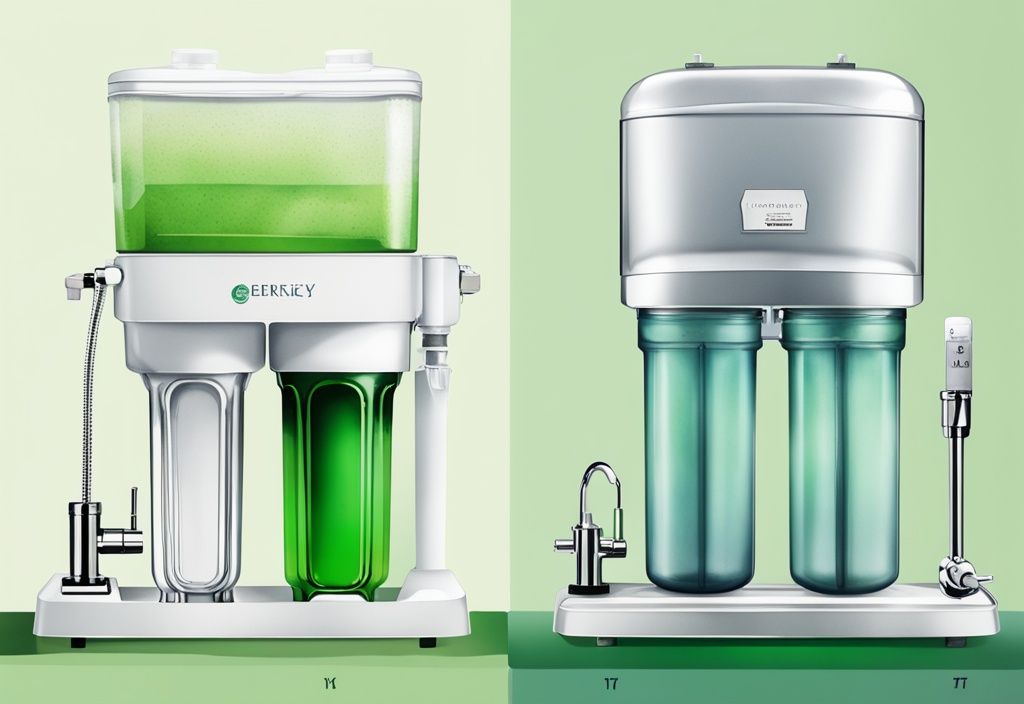
Pros and Cons of Berkey Filters
Let’s talk about the upsides and downsides of Berkey filters. On the plus side, these filters are incredibly portable and don’t require electricity, making them perfect for off-grid adventures or emergencies. They are easy to set up, have a long filter lifespan, and require minimal maintenance. Plus, they do an excellent job of removing bacteria and viruses.
However, it’s important to consider some potential drawbacks. The filtration process can be slower than other systems, and Berkey filters lack NSF certification, which might raise questions about their claims. There’s also a chance of leaks, and you might need to purchase additional fluoride filters. Plus, they do take up counter space, which could be a concern if your kitchen is on the smaller side.
When weighing Berkey vs reverse osmosis, Berkey offers an eco-friendly and portable solution, though it may not match the speed and certification of reverse osmosis systems. Ultimately, it’s about finding the right fit for your lifestyle and values.
Exploring Reverse Osmosis Systems
In the ongoing discussion of Berkey vs reverse osmosis, understanding the nuances of each system can guide you in making an informed choice. Here, we delve into the workings and considerations of reverse osmosis systems, highlighting their strengths and potential drawbacks.
How Reverse Osmosis Works
Reverse osmosis (RO) systems are like the unsung heroes of water purification. Imagine a high-pressure electric pump working tirelessly to push water through a semi-permeable membrane. This process is not just about filtering; it’s about transforming. By removing impurities such as bacteria, viruses, and a cocktail of chemicals, RO systems elevate the taste and smell of your water. It’s like turning tap water into a refreshing oasis, especially in areas where water quality is less than ideal.
In my own journey toward non-toxic living, I remember the first time I tasted water from an RO system. It was a revelation—clean, crisp, and pure. It’s no wonder that in the Berkey vs reverse osmosis debate, RO systems are often praised for their thorough filtration. However, keep in mind that these systems do require an electrical connection to operate.
Advantages and Disadvantages of Reverse Osmosis
When weighing the pros and cons of Berkey vs reverse osmosis, it’s essential to consider what RO systems bring to the table. Their high filtration efficiency is a major plus, removing a wide range of contaminants and ensuring consistent water quality. This is a game-changer for anyone concerned about what might be lurking in their tap water.
However, every rose has its thorn. RO systems can strip away beneficial minerals, which might leave your water lacking in nutritional value. There’s also the issue of wastewater production, which can be a concern for those of us mindful of our environmental footprint. And let’s not forget the need for electricity, which adds to both operational costs and carbon footprint.
Space is another consideration. These systems can be bulky, requiring ample room for installation. Plus, the initial setup and ongoing maintenance can be costly. It’s crucial to weigh these factors carefully when deciding between Berkey and reverse osmosis systems. Personally, I’ve found that understanding these nuances helps in making a choice that aligns with both health goals and environmental values.
Berkey vs Reverse Osmosis: A Detailed Comparison
Choosing between Berkey and reverse osmosis systems can feel like navigating a maze of information. Each system has its own strengths and weaknesses, and understanding these can help you make a decision that aligns with your health priorities and lifestyle. Let’s explore the nuances of each system, from filtration efficiency to environmental impact.
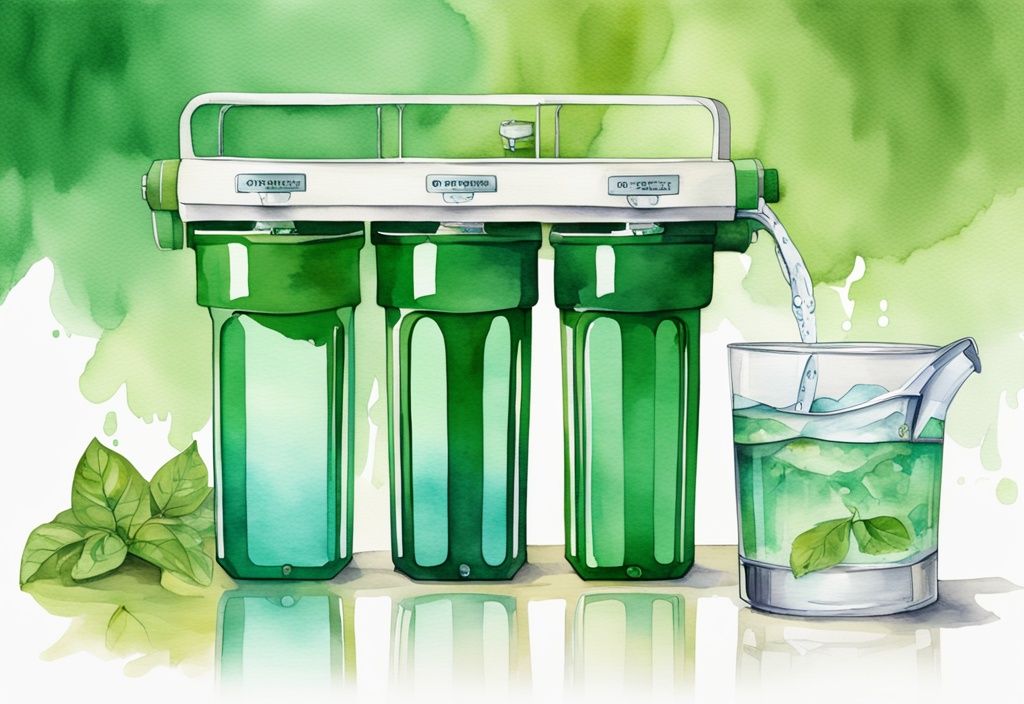
Filtration Efficiency: Berkey vs Reverse Osmosis
When I first started exploring water filtration options, I was struck by the unique capabilities of Berkey and reverse osmosis systems. Berkey filters are remarkable for their ability to remove 99.9999% of pathogenic bacteria while keeping essential minerals intact. This is a huge plus if, like me, you value mineral retention for health reasons. On the flip side, reverse osmosis systems are champions at eliminating 98% of contaminants, including dissolved solids and heavy metals. However, they also strip away beneficial minerals. This difference in filtration efficiency can be pivotal, depending on what you prioritize for your health and water quality.
Portability and Setup: Berkey vs Reverse Osmosis
I’ve always appreciated the simplicity and portability of Berkey systems. They require no electricity or plumbing, making them a breeze to set up and perfect for those who need flexibility. Whether you’re moving homes or just want an easy-to-use system, Berkey fits the bill. In contrast, reverse osmosis systems are more of a permanent fixture. They often need professional installation and stable water pressure, which is ideal if you’re looking for a comprehensive, long-term solution. Your choice here might depend on how much you value convenience versus permanence.
Reliability and Certification: Berkey vs Reverse Osmosis
When it comes to reliability and certification, the differences between Berkey and reverse osmosis systems are worth noting. While Berkey filters are effective, they lack NSF certification, which might be a concern if you rely heavily on verified claims. Many reverse osmosis systems, however, do carry NSF certification, offering peace of mind about their performance. This aspect can be crucial if certification is a significant factor in your decision-making process.
Cost and Maintenance: Berkey vs Reverse Osmosis
As someone who is mindful of budget, I found the cost and maintenance of Berkey systems to be quite appealing. They generally have a lower initial cost and minimal maintenance expenses, making them a great option if you’re watching your spending. On the other hand, reverse osmosis systems can be more expensive upfront and require ongoing maintenance, like regular filter and membrane replacements. These financial considerations are important, especially if you’re planning for the long term.
Environmental Impact: Berkey vs Reverse Osmosis
For those of us who care deeply about the environment, the ecological footprint of these systems is a key consideration. Berkey systems are more eco-friendly, producing no wastewater and operating without electricity. This makes them a fantastic choice if you’re looking to minimize your environmental impact. Conversely, reverse osmosis systems generate 3 to 4 gallons of wastewater for every gallon purified and rely on electricity, which might be a concern if you’re aiming to reduce your ecological footprint. These environmental factors are essential to consider for a sustainable lifestyle.
How to Choose Between Berkey and Reverse Osmosis
Deciding between Berkey and reverse osmosis systems involves understanding your unique needs and circumstances. This guide explores key factors such as portability, contaminant removal, budget, and environmental impact to help you make an informed choice.
Which System is Best for Your Needs?
When I first faced the choice between Berkey and reverse osmosis, I remember feeling a bit overwhelmed. It was like standing at a crossroads, each path offering its own set of benefits. Let’s break it down together, so you can find the system that fits your life just right.
Portability was a game-changer for me. Berkey systems, with their gravity-based operation, became my go-to for off-grid adventures and emergency preparedness. They’re like a trusty companion, always ready to provide clean water without needing electricity. On the flip side, reverse osmosis systems are more like the reliable anchor at home, requiring stable water pressure and power, making them perfect for a permanent setup.
Now, let’s talk about the range of contaminants. Both systems are filtration powerhouses, but they tackle the job differently. Berkey filters are fantastic for removing bacteria, viruses, and heavy metals, all while keeping those beneficial minerals intact. It’s like having a guardian that knows what to keep and what to let go. Meanwhile, reverse osmosis systems are thorough, eliminating dissolved solids and a wide array of contaminants, though they do strip away essential minerals in the process.
Considering the budget aspect, I found Berkey systems to be kinder on the wallet initially, with minimal maintenance costs. They’re a smart choice if you’re looking for affordability without compromising on quality. However, reverse osmosis systems, while more expensive upfront, offer comprehensive filtration, though they do come with ongoing maintenance expenses like filter and membrane replacements.
Lastly, the environmental impact is something close to my heart. Berkey systems shine here, producing no wastewater and requiring no electricity, aligning perfectly with eco-friendly goals. It’s like giving a little hug to Mother Earth. Reverse osmosis systems, despite their effectiveness, do waste several gallons of water for every gallon purified and rely on electricity, which might not sit well with those prioritizing sustainability.
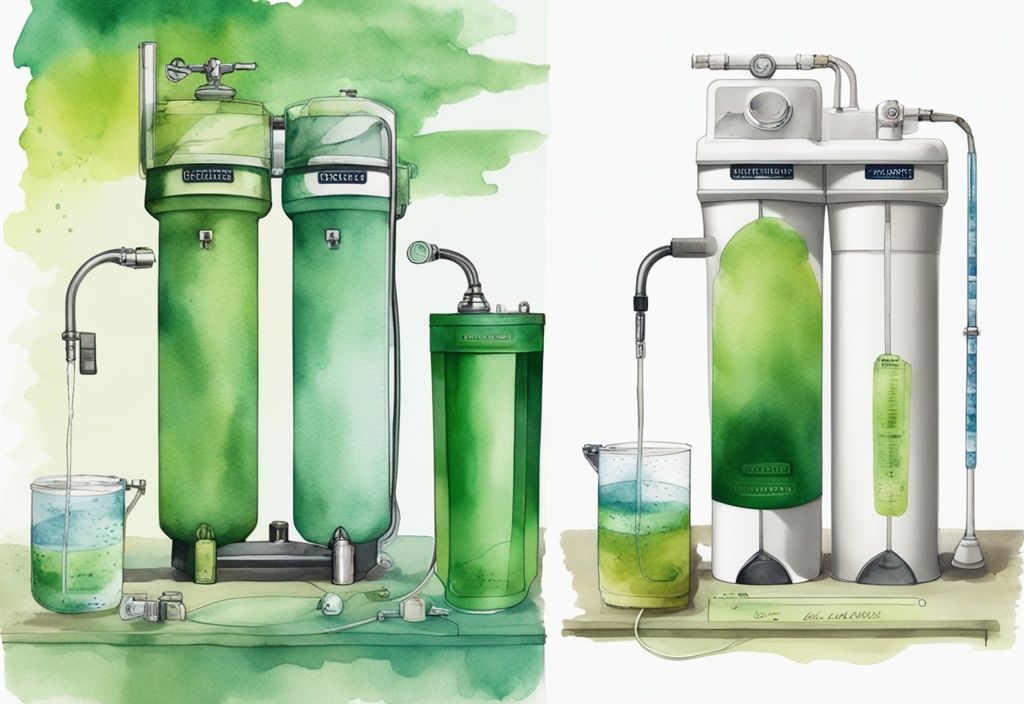
In the end, choosing between Berkey and reverse osmosis systems is a personal journey. If portability and eco-friendliness are your priorities, Berkey might be your perfect match. But if you need comprehensive filtration for a fixed location, reverse osmosis could be the way to go. Whatever you choose, know that you’re taking a step towards a healthier, more sustainable lifestyle.
FAQ
In this section, we delve into the essential questions about Berkey filters and reverse osmosis systems, helping you make informed decisions for cleaner, safer water.
What contaminants do Berkey filters remove?
From my own journey towards a non-toxic lifestyle, I’ve found Berkey filters to be a game-changer. They effectively remove a wide range of contaminants, including bacteria, viruses, cysts, parasites, lead, mercury, and chlorine. These filters are designed to tackle both organic and inorganic pollutants, ensuring that your drinking water is as clean and safe as possible. It’s reassuring to know that with Berkey, you’re taking a significant step towards healthier living.
How eco-friendly are reverse osmosis systems?
When I first explored water filtration options, I was surprised to learn about the environmental impact of reverse osmosis systems. They tend to be less eco-friendly due to significant water waste and reliance on electricity. For every gallon of purified water, several gallons are wasted, which makes them less sustainable compared to other filtration methods. It’s a factor worth considering if you’re committed to reducing your environmental footprint.
Do Berkey filters need electricity to function?
One of the things I love about Berkey filters is their simplicity. They operate without electricity, utilizing gravity to filter water. This makes them an energy-efficient choice for those of us seeking a sustainable water filtration solution. It’s comforting to know that even in a power outage, you can still have access to clean water.
How often should you maintain reverse osmosis systems?
Maintaining reverse osmosis systems can be a bit of a commitment. Regular maintenance is crucial, including frequent filter and membrane replacements. This ensures optimal performance and longevity of the system, maintaining high water quality standards. It’s a bit like tending to a garden; with consistent care, you reap the benefits.
Can Berkey systems be used in emergencies?
I’ve always been an advocate for being prepared, and Berkey systems are ideal for emergencies. Their portability and independence from electricity make them a reliable source of clean water in off-grid situations or during power outages. It’s a comforting thought to have a dependable solution when you need it most.
Conclusion
Reflecting on my own journey towards a healthier lifestyle, I’ve often pondered the choice between Berkey and reverse osmosis systems. Each has its unique strengths and challenges, and it’s essential to weigh these based on your personal needs.
When I first explored the Berkey vs reverse osmosis debate, I was drawn to the Berkey system’s portability and simplicity. It’s perfect for those of us who cherish off-grid adventures or need a reliable option during emergencies. The fact that it doesn’t require electricity and comes with a lower initial cost was a big plus for me. However, I did pause at the lack of NSF certification, which made me question the filtration claims.
In contrast, reverse osmosis systems offer a different kind of peace of mind. They provide comprehensive filtration, tackling a wide range of contaminants, including dissolved solids and heavy metals. Many RO systems are NSF certified, which reassures me of their effectiveness. Yet, the higher installation and maintenance costs, along with the need for electricity and the production of wastewater, made me consider their environmental impact.
As you decide between Berkey and reverse osmosis, think about factors like overall cost, maintenance, and how eco-friendly each option is. Berkey systems stand out for their environmental friendliness, as they produce no wastewater. Meanwhile, RO systems might be more appealing if you’re looking for consistent water quality in a fixed location.
Ultimately, your choice should resonate with your specific needs and priorities. It’s about finding a balance that supports a healthier and more sustainable lifestyle. Remember, every step you take towards non-toxic living is a positive one, both for your well-being and the planet.
Hi, I’m Olivia Green, the voice behind nontoxicways.com. I’m passionate about helping you make the shift to a healthier, non-toxic lifestyle without feeling overwhelmed. I love sharing my personal journey, from small changes to big transformations, along with practical tips that make it all feel doable. My goal is to inspire and guide you toward a lifestyle that benefits both your well-being and the planet. Let’s take this journey together, one simple step at a time!
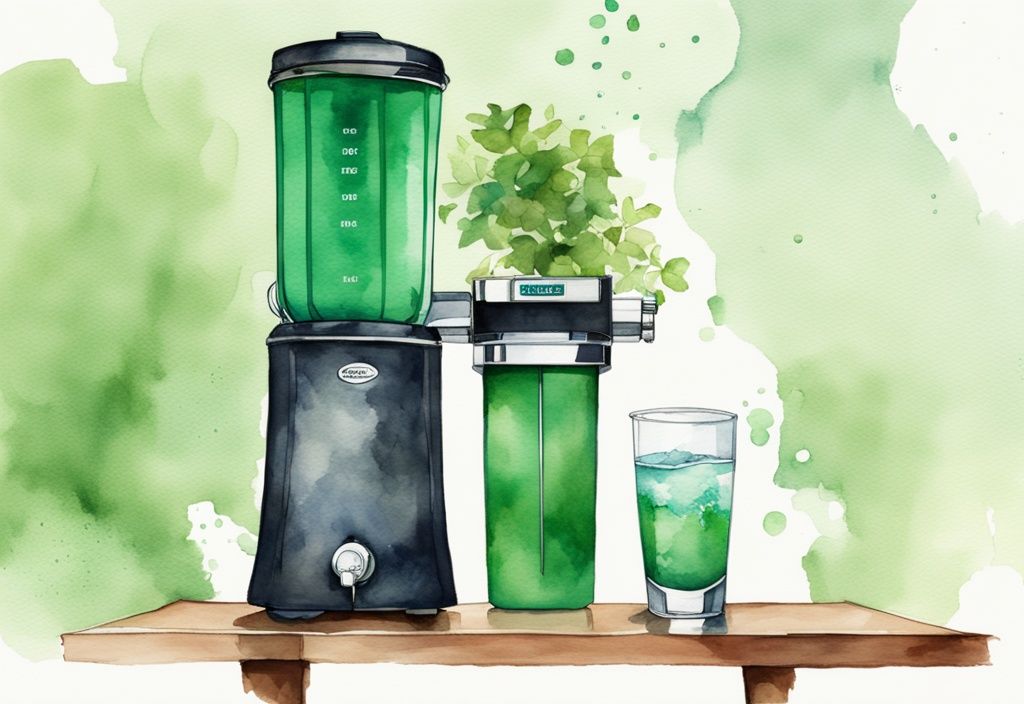
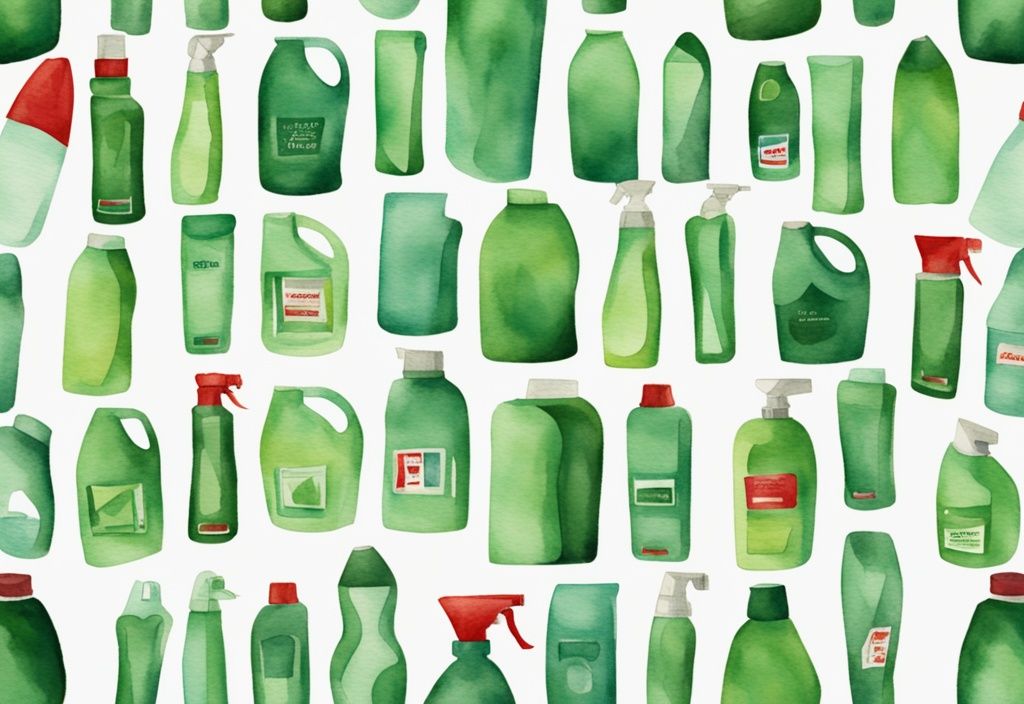










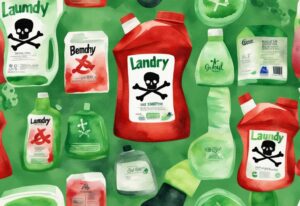

Post Comment